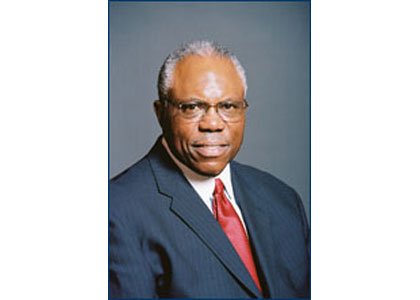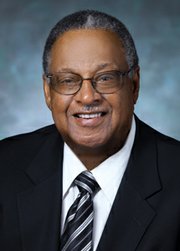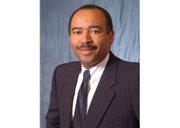BALTIMORE — While statistics continue to reveal a dearth of African American’s in hospital leadership roles around the nation, three Baltimore health institutions have made history.
Ackneil Muldrow, director, Bon Secours Hospital
Harry S. Johnson, chairman board of directors at GBMC Healthcare
At press time, an African American served as head of the board of directors at Bon Secours Baltimore Health System, the Greater Baltimore Medical Center and LifeBridge Health.
“I don’t think this has ever happened where you have three at one time serving as director or CEO of hospital boards in Baltimore or anywhere else,” said Neil Muldrow, the director of Bon Secours Hospital System, who was elevated to the post on January 1, 2014.
Muldrow’s comments came weeks before the death of Walter Amprey, who chaired the Board of Directors at LifeBridge until he passed away on April 22, 2014.
“Amprey’s contributions were numerous,” said Muldrow. “There were a whole lot of positives about his public and volunteer life. He’ll be greatly missed.”
Still, the significance of having African Americans in such a position can be broadly measured, but the primary importance is understanding the needs and challenges of various patients, particularly blacks, Muldrow said.
“When it comes to healthcare, you have people involved in governance and in making policies for the hospital who can reflect more broadly on the needs of the community,” said Muldrow, who once headed the Development Credit Fund, Inc, a $14 million commercial lending fund manager that provided loans to small and minority-owned businesses in the mid-Atlantic Region.
Muldrow also served on the state’s first Lottery Commission and he sat as a member of the University of Maryland’s Chancellor’s Advisory Board, the University of Maryland Medical System, the James Lawrence Kernan Hospital and the College of Notre Dame of Maryland.
In 2013 nationally, 47 percent of not-for-profit hospital governing boards lacked blacks or other minorities on their board, according to the Governance Institute, a consultant group who tracks such trends.
Also, two of the most recent American Hospital Association triennial governance surveys reportedly found that minority board members accounted for just nine percent of hospital directors and trustees in 2009 and 10 percent in 2011.
“There are good things happening here and we are working to make sure to deliver services that are beneficial for our communities,” said Harry S. Johnson, who three years ago was named chairman of the GBMC Healthcare Inc. Board of Directors, one of the regions key medical institutions.
Johnson, who became the first black partner at the law firm Whiteford, Taylor & Preston in 1986, said support among his contemporaries has helped him to remain focused on the task of doing what’s best for the greater Baltimore community.
He also sits as the first African American president of the State Bar Association, a position that’s also received overwhelming support from other black professionals, he said.
“I grew up in an era of activists, people protesting the Vietnam War. I saw that for African Americans the law was a way of improving their lives and I saw people like Barbara Jordan and Shirley Chisholm making political changes,” Johnson said.
“So, what we’re doing here in the hospitals is similar in that we can help make things better.”
Amprey’s journey also included helping and serving others.
A national vice president of the Urban Education of National School Conference Institute, Amprey served as superintendent for public instruction of the Baltimore City Public Schools.
“With Dr. Amprey’s unmatched vision and dedication, we know how fortunate we are that he is the chairman of the board of directors of LifeBridge Health, one of the largest most comprehensive health care systems in Maryland,” said Helene King, a communications coordinator at LifeBridge.
Muldrow, Johnson and Amprey have worked tirelessly to eliminate the health disparities that have disproportionately affected minorities and poor, and they’ve helped their respective institutions in making great inroads in not just health endeavors, but within the community itself.
Muldrow says improving the health of the community has driven Bon Secours vision and has also helped changed the way the hospital addresses local needs. Among the many projects, Bon Secours launched programs, including investing in local row homes, that expanded its reach in West Baltimore.
A 2012 study revealed that the hospital contributes more than $226 million to the city’s economy while supporting more than 1,500 jobs at $94 million annually.
“Twenty percent of our employees live in the community, so you’re having an impact there by employing people who work in the neighborhood,” Muldrow said.
Meanwhile, Johnson has stirred GBMC to a positive rating outlook from the Wall Street bond rating company, Moody’s. The company reported that GBMC has strengthened its financial performance in the last two fiscal years and expectations are that the trend will continue this year.
At LifeBridge, Amprey helped assume a leadership role in advocating for investment of resources in the Randallstown and Park Heights areas and support appropriations for programs designed to address the needs of distressed and transitional areas, hospital officials said.
LifeBridge contributes more than $40 million annually in community benefit activities and provides about $17 million in charity care, $9 million in health profession education and $3 million in community health services such as health screenings, wellness, and self-help.
“Our story is different,” Muldrow said. “That’s why I remain at Bon Secours because it’s been so gratifying. We have gone beyond just how to bring medicine in, and we’ve gotten the message out to the community.”
For the three local African American hospital heads, however, resting on their laurels will never suffice.
“Walter Amprey is a great person and Harry Johnson has done a wonderful job over there and now we have made history,” Muldrow said. “We will continue to try and open doors because there have been a lot of times [when] people of color have gone through these doors and have closed them. Not us.”


